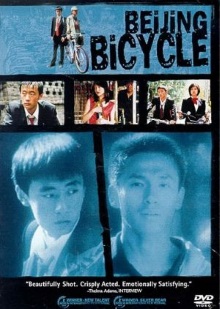
This is the first film I’ve watched by a Chinese director of some renown, Wang Xiaoshuai. He is apparently considered a member of China’s Sixth Generation of filmmakers, and while I am skeptical of such labels, I suppose it does have some relevance here as one of their defining characteristics is more individualistic films that highlight the tensions in the country’s rapid modernization and urbanization. I’m also amused that the two male leads in this film are nobodies but the two supporting actresses are huge stars today, though their roles here are relatively minor.
Guei is a country boy who arrives in Beijing to look for work. When a courier company employs him and assigns him a high quality bicycle that he will have to pay off over time, he is immensely pleased and proud of it. As a fish out of the water everything in the city is new to him but he does his best at his job until one day the inevitable happens: his beloved bicycle is stolen and he is fired for failing to deliver a package on time. After much begging, his boss agrees to take him back if he manages to find his bike. Meanwhile, the audience sees that the bike is now in the possession schoolboy Jian. He uses it to commute to school but more importantly it’s a way for him to hang out and bond with his friends as well as a girl he likes. We also learn that his father had promised to buy him a bike but repeatedly put it off in order to afford school fees for his younger sister. Eventually Guei does find the bike again and snatches it but Jian gathers his friends to get it right back, kicking off a back and forth struggle.
There are all sorts of themes present here, Guei being the country boy and Jian being the city kid for example, despite both being poor; how Jian is more or less left to his own devices by his father as a parable on the alienation of city life, the supposedly rich girl that Guei and his friend spy on living miserably in a huge apartment and so on. However as the director never confronts these issues head on, referring only to them obliquely, at its heart the film has the very simple story of these two boys tussling over a bicycle. That’s not a bad premise on which to build either, except that the gang around the bicycles is strangely insular. Despite his youth, Guei should really be considered a working adult and the way he deals with the schoolkids and how they deal with him feels utterly unreal to me. It’s pretty ridiculous that the courier company would do nothing about a gang of kids who claim that one of their rider’s bikes is theirs. For all of these reasons I found it hard to take this film seriously especially combined with stylistic touches such as Zhou Xun’s character never uttering a single word of dialogue even when the situation calls for some explanation.
These difficulties are compounded by the fact that the two male leads here are simply not very good actors. Guei’s iron-headed determination is clearly meant to evoke the sympathy of the audience but I feel more tempted to mock his stupidity and pitiful passivity instead. Jian, poor or not, is simply a bullying asshole who deserves neither the girl nor the bicycle. The two female leads are miles better, both already being experienced actresses before taking roles here, but as I’ve previously mentioned they’re only minor supporting characters. My wife talked about Edward Yang’s A Brighter Summer Day and I too can see how director Wang could have been going for a similar effect here with amateur actors. While Yang’s films may be obscure in parts due to the audience’s incomplete information, this film feels deliberately obtuse as a stylistic effect. The world it evokes feels bizarre, operating according to some logic of its own that we can’t fathom.
If I seem unduly harsh, it’s because I see how this could have been a great film if only it were more competently directed. As it is Beijing Bicycle isn’t awful, merely sort of mediocre. It’s just very frustrating to see the potential being squandered.